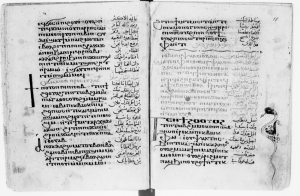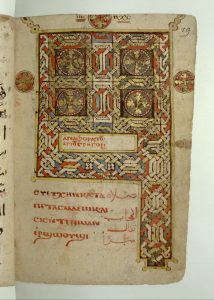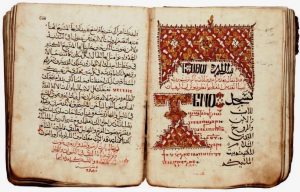Part 3 – Where do we stand now?
My goal in the previous two posts was to show that the movement of Irian Effendi Moftah to change the Coptic language is the major contributor in the current conflict. What we are experiencing now is confusion due to not following a specific pronunciation. The truth of the matter is, since that movement, the cantors, deacons and congregation have been in the middle. We neither use the original pronunciation nor do we follow the rules and guidelines of the fabricated one. THIS IS KEY!
This point is clear in a number of hymns, especially the ones that are known by the entire congregation of the Church. It is also evident in certain words that are repeated in almost every hymn or text used in liturgical worship.
1. Agioc In the first and second verse of the Trisagion there are several words that fall into this category.
The first word is genne;eic. As a child I remember this word being pronounced as “Jennetees”. If I were to read it by the standards of today’s Coptic pronunciation, it would be “Genethees”. Hence the predicament! Because this hymn is chanted in every single liturgy, the cantors, deacons, and all the people know this word by heart. They never altered the sounds of this word to the fabricated Coptic. So the Egyptian congregants kept chanting what they grew up hearing even though the “rules” had changed.
You can enjoy watching Cantor Tawfik chant Agios here: https://www.youtube.com/watch?v=T6oTI55Rrq4 Listen for “jennetees”.
The second phrase is w ctaurw;ic di ymac. There are two points I want to clarify regarding this section. The first is that the word pictauroc is the Coptic word for cross. It was originally pronounced as “Bistawros,” the u being a “w’. (I will come back to that point and elaborate on it in another, more critical example). This is why you may have family members or friends with the name Bistawros. The second point is that both letters, : and D, only had one phonetic sound each. : was used solely as a “T” sound, and D as a “D” sound respectively. If you have ever wondered why your parents can’t pronounce the phrase “thank you” correctly, the answer is evident. The Egyptians never had a “th” sound in their language. So even when the Arabs came into Egypt with a “th” sound in their language, your ancestors couldn’t pronounce it. Only recently, with the immigration and education surge, have we begun to try to correct this issue. The same concept applies to the “D” sound. The Arabic language has 2 or 3 “d” sounds depending on how you interpret them. When our parents speak arabic you can only hear one.
2. A word like Ouoh. Anyone who knows the Coptic language knows that we pronounce this word as “owoh”. The emphasis here is on that middle “w” sound. If we were to read this word by today’s fabricated dialect it would sound like “oo oh”, as two separate syllables and without the “w” sound in between. However, I have never heard it being pronounced that way, neither by cantor, nor by a deacon or even a congregation member.
3. The word Cw;ic. In most parishes, till this day, this word is pronounced as “So tees”. Reading the word with today’s understanding, it should be “Sothis”. This goes back to the fact that the : in Coptic only had one sound.
4. The name of His Holiness Pope Tawadros. Ever wonder why his name isn’t pronounced Theodoros? Refer to the last sentence in the above point 3.
There are a numerous amount of examples like those mentioned above with many other sounds and letters. Please refer to Fr. Shenouda’s thesis which is linked in the first post on this subject.
Here we can see that our current use of the Coptic language in the Church isn’t accurate or standard. It is neither following the standards of the correct pronunciation or by the pseudo-coptic, but rather what most people are used to. This is what led the modern day scholars and cantors to try to “fix” the exceptions that still prevail in the current pronunciation.
If you have questions or suggestions please feel free to contact me!


